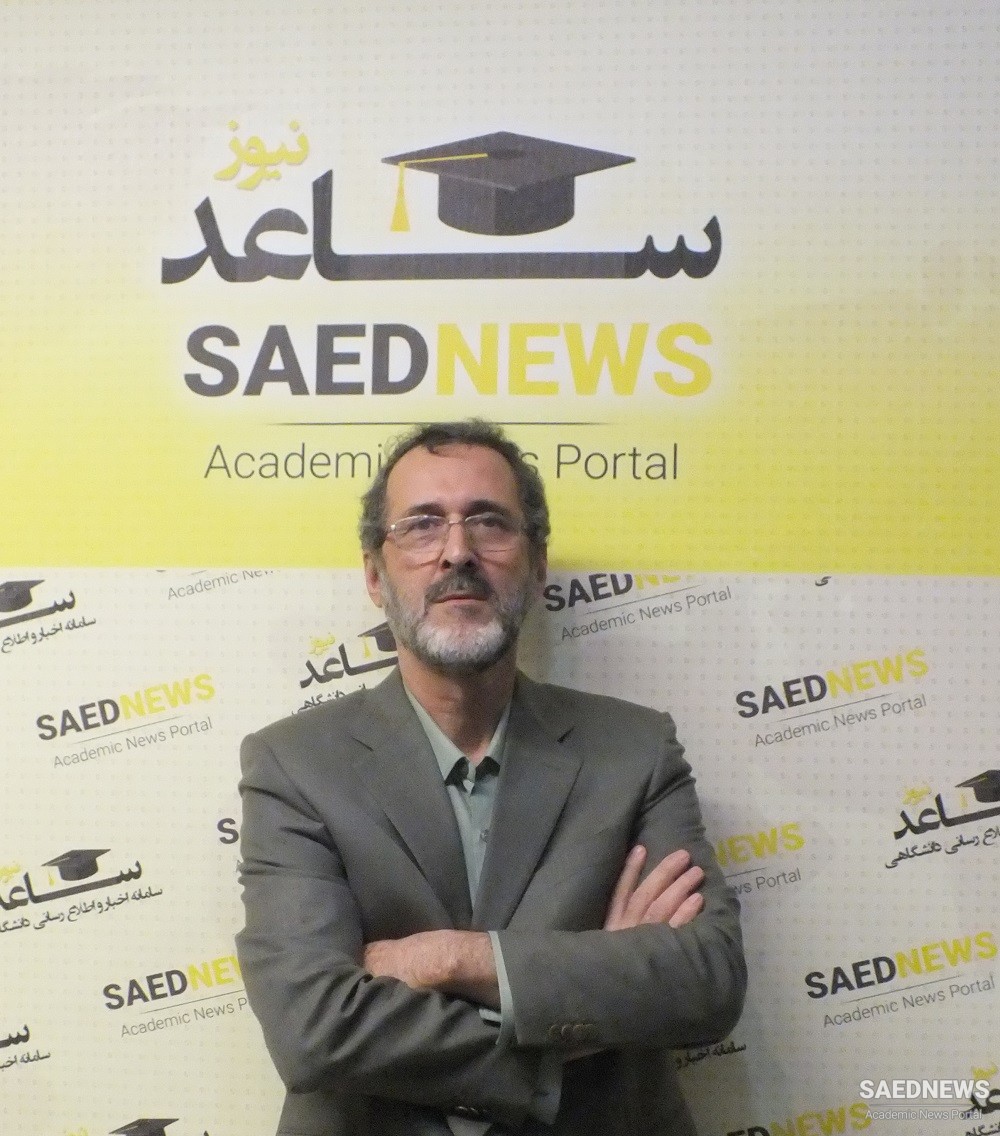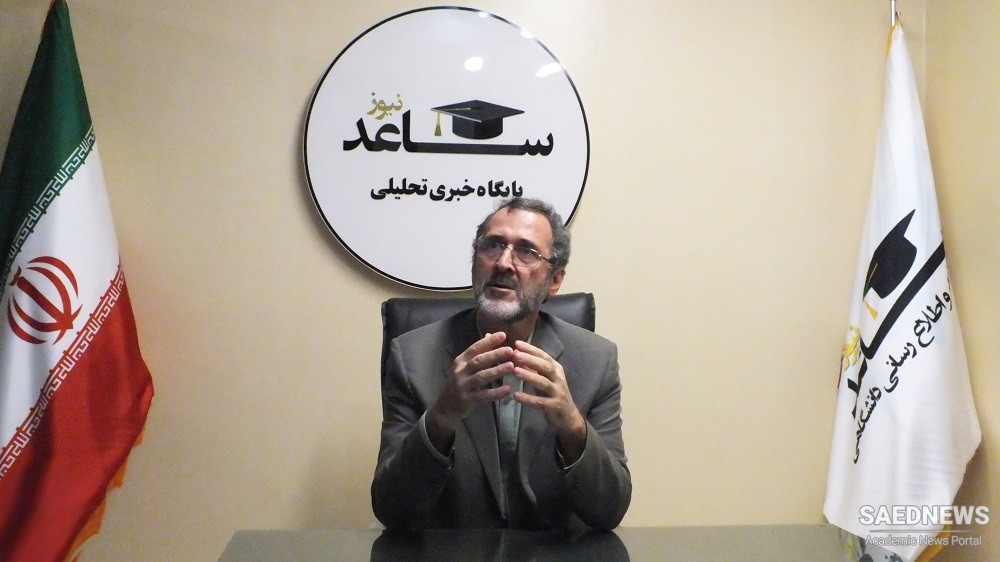Professor Qassem Pourhassan from Allameh Tabatabaei University of Tehran has continued his re-evaluation of the tradition of philosophical thought in Iran after the publication of his tripartite work on Farabi and designed a three volume collection on Avicenna devoted to a new reading of Peripatetic philosophy and Avicenna. The first volume of this collection has lately been released and on this occasion we conducted an interview with Professor Pourhassan.

SAEDNEWS: You have published a new work on Avicenna that is the first volume of a tripartite collection. Would you please tell us why do we need a new reading of Avicenna in the light of the so called notion of “Iranian Intellect” and “Illuminative Theosophy” despite so many existing works in various languages inside and outside Iran on Peripatetic philosophy in general and Avicenna in particular?
Professor Qassem Pourhassan: Perhaps the most important question in this context is why we need to engage in a new reading of the tradition of philosophical thinking in Iran. A similar question has been raised by Martin Heidegger in the lengthy introduction of his monumental Sein und Zeit (1927) concerning the necessity of restating the question of Being. He answers three questions in this part of his book; Heidegger argues that restating the question of Being helps us firstly, to understand the question of Being itself, second, to understand the need for raising such a question, and thirdly, to find a path for correct stating of this question. In my preface to the first volume of this tripartite work entitled “Avicenna and Iranian Intellect”, I have sought to discuss this question from these three perspectives, i.e. understanding the need for a re-view of the Iranian tradition of philosophical thought and Avicennan philosophy, understanding the necessity of this revision and finding a path for a correct re-reading of Iranian philosophical tradition.
As I have stated it in my preface to the book, unfortunately despite all the efforts made in these years, we did not have a correct encounter and a fundamental reading of Iranian philosophical thought, Avicenna and the origins of our philosophical thinking. We have read Avicenna and Farabi under the influence of the orientalists and failed to have an independent view of these two philosophers or to consider all dimensions of the philosophical thought of our philosophers.
I believe that Farabi and Avicenna have presented an intellect that is a moral intellect, in the words of Farabi, and a human intellect, according to Avicenna. This moral and human aspect of Iranian intellect has been neglected indeed. The dominant view is that Farabi and Avicenna have expanded Aristotelian intellect while we see that Farabi discusses the foundations of ethics and a moral society and Avicenna offers his innovative ideas of human nature. Have we studied the philosophical system of these two philosophers in this way? Have we analyzed Farabi’s Virtuous City independent from Platonic city?
Then, three basic questions have to be asked here. First question is that so far we have failed to have a correct reading of philosophical systems of Farabi and Avicenna. The tradition of philosophical thought in Iran is multidimensional. It is this multidimensionality that changes it into a concrete philosophy, because society, ethics, culture and human being are significant for this philosophy and deserve to be discussed as problems. This important and fundamental aspect of the Iranian tradition of philosophical thought has been neglected. What we have read is Aristotelian intellect, Aristotelian logic and understanding Farabi and Avicenna in terms of Greek notions. We have tried to interpret Islamic philosophy as the midday of Greek intellect. This is why we have preferred to read Avicenna in Shifa and Nijat not in Al-Mubahithat, Mantiq Al-Mashriqyin and his mystical and allegorical essays! This is also why Corbin insists that Averroes should be blamed for our partial and imperfect understanding of Avicenna. According to Corbin, Averroes taught Avicennan philosophy to the West in a bobtailed way.
Of course, we should not forget that the main reason of this incomplete reading of Avicenna is our failure of knowing the illuminative intellectual foundations and negligence of Iranian Intellect and Zoroastrian tradition. The philosophies of Farabi, Avicenna and Suhrewardi should be revisited in the light of this Iranian Intellect. This is why I believe that an independent review of these thinkers can be helpful not the views offered by the orientalists and Arab intepreters.
The second problem that needs to be discussed here is that both Abdulrrazaq in his Islamic Philosophy and Ibrahim Madkour in his History of Philosophy have discussed the nature of Islamic philosophy in a precise form. This philosophy should be read from the scratch. For it has not been studied and assayed in a correct way.
As a matter of fact, we have not succeeded to delve into the thoughts of Farabi and Avicenna from the point of view of the origins of Iranian-Islamic philosophical thinking. As previously mentioned, we have understood the philosophical thoughts of these philosophers either as part of Greek tradition or in a partial and incomplete way.
The third problem that I would like to discuss here is the structure of the first volume of my tripartite work on Avicenna. The first volume has been published in 900 pages in four parts by Siraat Publishing House. In my preface, I have critically reviewed the existing interpretations and discussed the foundations of my proposed reading. From this perspective, the study of preface of this book is of paramount importance. In first part under the title of “Time and Background” I have explained the key events in the intellectual life of Avicenna within the context of the historical developments of his time. The second part presents a typology of Avicenna’s works, essays and books. In the third part, I have offered a detailed discussion of the foundations of Avicenna’s philosophical system, nature of his intellectual system as well as the grounds of Avicennan illuminative theosophy. Finally, in the fourth part of the book, I have revisited Avicenna’s ontology as compared to Greek tradition.
In the second volume of this collection, I intend to debate Avicenna’s anthropology. The third and last volume will be devoted to the discussion of ethics, power and society. In Farabi’s collection, the volume related to ethics and power will be published soon.
In a nutshell, my core claim in this collection is that we have not grounded our studies of Avicenna in a correct reading of him and then, we need to re-view Avicenna’s works from the point of view of Iranian tradition and intellect. Even I believe that Alfonso Nallino has also failed to have a correct reading of Avicenna as he has become stuck in Eurocentrism too. Nallino struggles to study Avicenna in the light of ideas of the western thinkers from Thomas to Suarez and the influences that these occidental philosophers have received from Avicenna. My last point is that Farabi and Avicenna are focused on ethics and human being and power is interpreted in terms of ethics just contrary to Greek tradition where nature or phusis is at the center. Farabi and Avicenna take human being, society and morality as the axis of their philosophical thoughts.
SAEDNEWS: In your answer to our question, you spoke of “concrete philosophy” in Iranian world and stated that one of the distinguishing aspects of philosophical thinking in Farabi and Avicenna is the attention paid to human being and society. Today we are living in one of the darkest moments of the history of world. 5 thousand children and 3 thousand women along with more than 4 thousand men have been slaughtered by Israel in Gaza and also Putin is killing Ukrainians in the name of the war against NATO on daily base just like the Zionists. What contribution would Farabi and Avicenna make to human society in its path to peace in this age of darkness?
Professor Pourhassan: Why do thinkers in modern west consider the modern reason inefficient? For this reason is not based on ethics. Questioning this reason is not a task just undertaken by Levinas rather this debate is even more fundamental than being just restricted to the intellectual system of a philosopher.
In the second chapter of the third part of my book, I have discussed Iranian intellect in full details. Iranian Intellect is an intellect that approaches the man from the point of view of his human identity not based on his being western or eastern! The west’s understanding of man is fragile and incorrect. This incorrect understanding ends up in domination and subjugation. Man qua man loses his value. Our problem is reducing human being to an adjective no matter if it is a western man or eastern man or a man of faith or the faithless! The idea that only someone deserves my respect who is of the same faith, creed, nationality, color or race as mine while the others do not deserve results in subjugation and crime against humanity.
If morality does not serve as the foundation, power would change into absolute domination and the system of power shall topple the system of erudition. Power is brutal in its nature whether in Russia or in West or in Eurpoe. This morality tames the power. The foundation of morality is paying attention to man qua man and his virtues and vices. Farabi and Avicenna are concerned with the pains of human being qua human being. They state that if you fail to acquire a correct understanding of human being, the system of power would slaughter the system of morality and human being.
It is not important where this bloodshed is done whether in Palestine or Ukraine or Yemen or Iraq. For it is human being who is taken to the slaughterhouse. I believe that with western reason a reductionist moral system has dominated the foundation of which is utility and profit. In other words, the basis of moral codes is profit. This view of morality victimizes human being.
Man is the heart of the universe. The only savior of this man in the rebellion of power is moral intellect or illuminative theosophy with a moral and human basis. At the end of Remarks and Admonitions, Avicenna states: a true sage is the one who understands human sorrows. Farabi was worried of the ignorance of humans and society. Avicenna is craving for the acquisition of truth, i.e. human being. We can revive this perspective of man and morality through a correct reading of our intellectual and philosophical tradition.
West victimized the morality. Unfortunately, many Muslim countries following the same trajectory. Every human being is entitled to enjoy the human rights regardless of his faith. Man qua man has the potentiality to acquire virtues. The key and central question of Farabi and Avicenna’s philosophical thought, then, is morality and man. This thought has the potency to reduce human pains and control the raging power by putting humanity and morality at the center.

















































